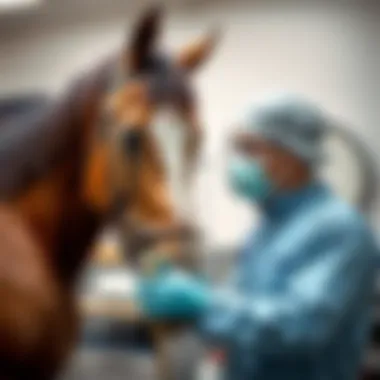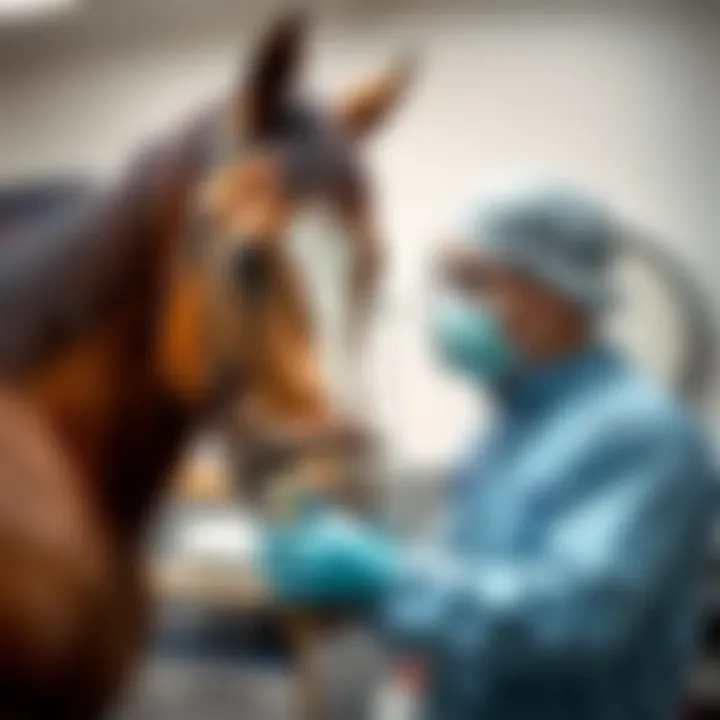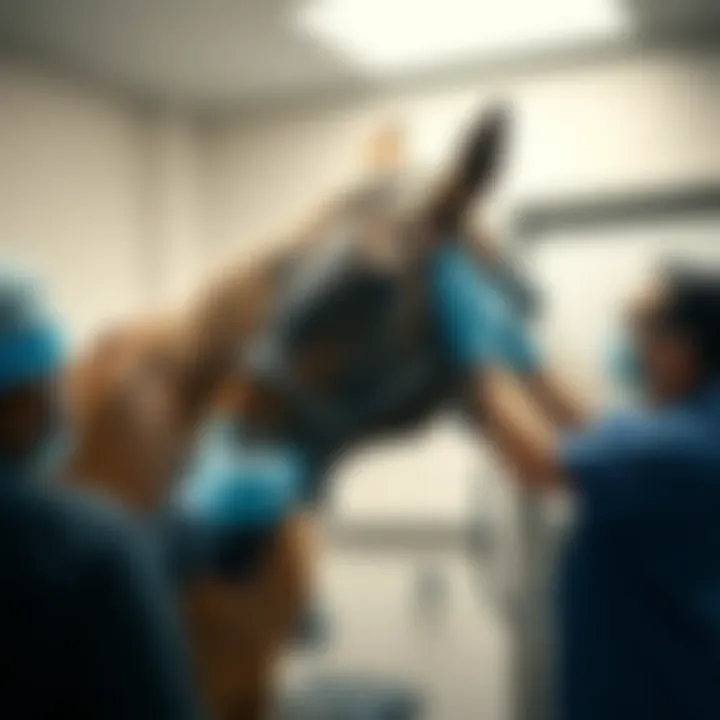Understanding Horse Veterinary Care Costs and Factors


Intro
Owning a horse brings a unique blend of joy and responsibility, particularly when it comes to their health care. Just like any other family member or beloved companion, your equine friend requires thoughtful consideration when it comes to veterinary services. This journey into the world of horse veterinary care involves navigating through various costs, understanding the nuances of treatments, and ensuring you’re effectively managing your budget.
Why Veterinary Care Matters
Veterinary care is essential not only for treating ailments but also for maintaining your horse's overall well-being. Regular check-ups can catch potential health issues before they escalate, saving you from incurring hefty costs later. The importance of preventive care cannot be overstated. Just like a stitch in time saves nine, spending on routine care often reduces the need for more extensive, expensive interventions down the line.
"An ounce of prevention is worth a pound of cure."
–– Benjamin Franklin
The Basics of Veterinary Expenses
Costs can vary widely based on numerous factors, such as geographical location, the specific treatments required, and even the kind of horse you own. Regardless, armoring yourself with knowledge about these expenses can help you make informed decisions. This article elucidates the key components of horse veterinary care, shedding light on costs, preventive measures, and the role of insurance in alleviating some financial burdens.
In the following sections, we will dissect the various aspects of veterinary care—from daily nutrition and preventive measures to behavioral insights and emergency preparedness—so you will be well-equipped to navigate the financial landscape associated with caring for your horse.
Being aware of these factors will not only ease the financial strain but also enhance the quality of life your horse experiences, making every dollar you spend worth the while.
Factors Influencing Horse Vet Bills
Understanding the costs associated with horse veterinary care can feel like navigating through a rabbit hole. There are numerous factors that come into play, shaping the bills that horse owners face. Recognizing these influences is crucial, not only for budget planning but also for ensuring the best care for equines. When one has a grip on these contributing elements, it leads to better decision-making regarding health care options, ultimately fostering a healthier and happier horse.
Type of Veterinary Services
The type of veterinary service required for a horse largely determines the associated costs. Veterinary services can be broadly categorized into routine care, emergency interventions, and specialized treatments. Each of these areas carries its own price tag.
- Routine Care: This includes vaccinations, dental check-ups, and hoof care. Routine visits typically cost less, but they are essential for preventing larger health issues down the road.
- Emergency Care: On the flip side, emergencies such as colic or fractures require immediate attention and can lead to hefty bills due to the urgent nature of the service needed. Horse owners might find themselves facing significant expenses without notice, which emphasizes the need for preparation.
- Specialized Treatments: If a horse requires specialized care, like orthopedic surgery or advanced imaging technique, the costs can skyrocket. These procedures often involve additional resources, specialized equipment, and longer recovery times, all of which contribute to a higher overall veterinary bill.
Understanding the scope of services is vital. It not only aids in prioritizing spending but also guides owners in seeking second opinions or alternative treatments when necessary.
Location and Accessibility
Geographical location plays a significant role in determining horse veterinary costs. Urban areas typically see higher prices compared to their rural counterparts. Here’s why:
- Cost of Living: In cities, the overhead costs for veterinarians—rent, utilities, salaries—are higher. These costs usually trickle down to the consumer, making regular vet visits more expensive.
- Availability of Services: Urban areas might have a larger pool of specialists. While more options can mean competition and potentially lower prices, specialized services may still come with a premium.
- Accessibility of Veterinary Care: In more remote areas, the lack of immediate access to veterinarians can drive up costs. Horse owners may have to pay extra for travel fees, or even consider long drives to get their horses seen, which adds to the financial burden.
It’s essential to understand these location-based variances when budgeting for equine healthcare.
Horse's Age and Health Status
Another pivotal factor influencing vet bills is the horse's age and existing health conditions. As with humans, aged horses often have greater health challenges, leading to more frequent vet visits. Here’s how age and health status can influence costs:
- Younger Horses: Typically, younger horses may require basic vaccinations and routine check-ups, which are relatively inexpensive.
- Middle-aged Horses: However, as they hit middle age, many horses start developing conditions that require more extensive care. This can include joint issues or metabolic disorders, leading to increased vet visits.
- Senior Horses: Senior horses present a different ball game altogether. These animals may require specialized care for chronic conditions, more frequent dental work, or even palliative care options. As the horse ages, the potential cost for maintaining their health rises significantly.
As horse owners navigate the journey of care for their horses, being aware of these age-related factors is essential to avoid unwelcome financial surprises.
Overall, understanding how these factors interplay not only prepares horse owners for the inevitable vet bills but also cultivates a proactive approach to equine health. Making informed decisions about vet visits can greatly ease the financial stress while keeping the beloved animals in top condition.
Typical Horse Vet Bill - Breakdown
Navigating the landscape of horse veterinary expenses can feel like walking through a minefield. Understanding how costs are structured helps owners make wise choices. The expense related to veterinary care often varies based on multiple factors, such as the type of care needed, the geographic location, and the specific condition of the horse. Breaking down typical horse vet bills into distinct categories provides clarity. This way, you can not only prepare for routine expenses but also cushion the blow when emergencies arise.
Routine Check-ups
Routine check-ups are essential for maintaining a horse’s health. These appointments typically include vaccinations, dental check-ups, and physical examinations. Regular visits help catch problems early, which may seem like a minor cost in the short term but can save a bundle down the road by preventing more significant issues.
The average fee for a routine check-up can range from $50 to $300, depending on the veterinarian’s location and experience. Annual vaccinations, for instance, might add $100 to $300 to your vet bill, while a dental examination may cost around $200. All in all, budgeting for these annual visits ensures that you stay ahead of potential health challenges.
Emergent Care Costs
Emergent care services can hit horse owners like a freight train. Unlike routine check-ups, these costs come as a surprise and can escalate quickly. An emergency call-out fee alone can be from $100 up to $300, not including the treatment required once the vet arrives. This underscores the need for a solid plan for unexpected veterinary visits。
Consider additional expenses for various procedures: treating wounds, administering medication, or hospitalization can quickly rack up bills that total several thousand dollars. If your horse faces a serious ailment or an accident, you might find yourself shelling out anywhere from $500 to several thousand dollars.
Specialized Treatments and Surgeries
Specialized treatments and surgeries represent a significant financial commitment. Each procedure varies between horses and conditions, leading to a wide spectrum of costs.
Orthopedic Surgeries


Orthopedic surgeries can be a godsend for horses suffering from lameness or injuries related to their bones and joints. These surgeries often aim to restore functionality, which is crucial for performance horses. It's worth noting that an orthopedic surgery can set you back anywhere from $1,500 to $5,000, depending on the complexity and region. One key characteristic of orthopedic procedures is their high success rate when performed correctly.
These surgeries are beneficial because they target the root causes of mobility issues. However, their unique feature lies in the rehabilitation that follows—costly and time-consuming but necessary for a full recovery. Owners need to balance the potential costs against the long-term benefits of restoring their horse's health.
Colic Surgery
Colic surgery is among the most urgent and costly procedures in equine care. The sick horse may show signs of severe pain in the abdomen, and when immediate action is necessary, costs quickly escalate. A typical colic surgery can cost between $3,000 and $10,000, depending on the emergency and follow-up care required. Immediate recognition of colic symptoms is crucial for the horse's survival.
This procedure is popular due to the significant difference it can make in saving a horse’s life. However, what sets colic surgery apart is the unpredictability of its success; some cases may face complications later on, leading to additional expenses. That’s a risk worth considering in any financial planning.
Soft Tissue Surgery
Soft tissue surgery addresses a variety of issues, from hernias to abscesses. Unlike orthopedic procedures, these surgeries focus on the muscles and soft tissues surrounding the horse's body. Costs can vary widely based on the type of surgery, typically ranging from $700 to $3,000.
Again, the critical characteristic of soft tissue procedures is their general necessity in treating non-bone related injuries. They are popular among horse owners for their straightforward approach to resolving issues that would otherwise limit the horse's performance and comfort. The quite defining feature here is the aftercare; intensive care is often required post-surgery, leading to a cumulative cost that needs to be factored into your budget.
"Being prepared for the big bills can make a huge difference in how you manage your horse’s health—a little knowledge goes a long way."
Overall, knowing the specifics behind typical horse vet bills can empower horse owners to be proactive rather than reactive to their animals’ needs. This mindfulness leads to better health outcomes and financial stability.
Preventative Care and Its Cost Implications
Preventative care in equine veterinary practice plays a crucial role not only in the health and well-being of horses but also in stabilizing the owner's financial responsibilities. Addressing health concerns before they escalate into serious ailments saves both time and significant amounts of money over the long haul. Regular check-ups and timely vaccinations can avert the need for expensive emergency interventions down the line. Understanding the various aspects of preventative care can help horse owners make informed decisions, thus managing their budgets effectively.
Vaccination Expenses
Vaccinations are an essential part of a horse’s health routine. These shots protect against a variety of diseases such as EEE (Eastern Equine Encephalitis), West Nile Virus, and Equine Influenza. While vaccination costs can vary based on location and the veterinary practice, owners typically face expenses in the range of $300 to $600 annually for complete vaccination programs.
- Core vaccines are universally recommended, which include the rabies vaccine and those for tetanus, Eastern and Western equine encephalomyelitis.
- Optional vaccines might include those for equine flu or herpesvirus, which depend on the individual horse’s risk exposure to certain diseases based on their age, usage, and environment.
It’s imperative to factor in the costs of these vaccinations, as failing to do so can lead to increased costs from potential outbreaks or serious health issues.
Dental Care
It's easy for horse owners to overlook dental care, mistakenly believing that it doesn’t have a direct impact on overall health. However, dental problems can lead to serious complications, including malnutrition and colic, which can spiral into costly treatments. Routine dental examinations and care should ideally happen once or twice a year.
The expense for dental care can run between $150 and $250 per visit. During these check-ups, the vet will check for issues like:
- Sharp points on teeth, which can cause painful sores in the mouth
- Worn or broken teeth that may require floating (filing) or extraction
- Impactions or infections, which can be path to serious health problems
Keeping up with dental care ensures your horse remains healthy, can eat adequately, and ultimately avoids pricier treatments in the future.
Routine Farrier Services
Regular farrier care is another significant aspect of preventative horse care. A horse's hooves need regular trimming and shoeing to maintain soundness and prevent lameness—a problem that can rack up veterinary bills. Farrier visits typically range from every 4 to 8 weeks, depending on the horse’s needs and workload.
Costs for farrier services can range from $50 to $150 per visit, depending on whether the horse is shod or getting just a trim. Here are key factors to keep in mind:
- Type of shoes: Standard shoes are less expensive than specialized or therapeutic shoes.
- Hoof condition: If the horse has underlying issues, the farrier might need to perform additional services like corrective shoeing, which can increase costs.
- Location: Prices can differ by region, with urban areas often commanding higher fees than rural settings.
Keeping a careful eye on hoof health can prevent minor issues from developing into serious conditions, helping horse owners avoid the much larger costs of corrective treatment later on.
"An ounce of prevention is worth a pound of cure." – Benjamin Franklin
Prevention in equine veterinary care isn’t merely a financial strategy but a commitment to the horse’s long-term health. Proper attention to vaccinations, dental care, and hoof maintenance can save owners from not only the stress but also substantial financial burdens brought on by negligence.
Comparative Analysis of Vet Pricing
Understanding the landscape of veterinary pricing is crucial for horse owners. Several factors can affect the cost of veterinary services, and a comparative analysis can shed light on these variations. By examining urban versus rural costs, regional differences, and how emergency services stack up against regular care, owners can better navigate their financial responsibilities. Being informed enables one to manage budgets effectively and make sound choices about their horse's healthcare.
Urban vs Rural Vet Costs
Veterinary fees often differ wildly between urban and rural areas. Typically, practices located in cities tend to charge more. Why? Well, the overhead expenses are notably higher in urban settings. Real estate costs, staffing, and general operating expenses contribute to the increased pricing. Additionally, urban veterinarians might have access to advanced technology and specialty services that come at a premium.
Conversely, rural vets generally have lower operational costs and may charge less for services. However, they might not offer the same level of specialty care as their city counterparts. This can pose a dilemma for horse owners who might live in a rural area yet require specialized services. When making choices, consider how far you’re willing to travel for routine check-ups versus emergency care. The savings from choosing a rural vet might be offset if you have to spend a lot on transport.
A wise horse owner will weigh the costs and benefits of local veterinary practices, considering factors like travel time and available services.
Regional Variations Across States


The pricing structure for veterinary care also varies significantly by region. Certain states have regulations, demand fluctuations, or socioeconomic factors that impact pricing. For example, in states with a high concentration of horse farms, competition may drive down prices as vets strive to attract clients. However, in less populated states, prices might be on the higher side, as fewer vets are available to service the needs of horse owners.
This regional disparity can be particularly pronounced with specialized services. High-demand areas might have vets that specialize in certain fields, providing quality care at competitive prices. Meanwhile, owners in different states may find that the same services cost a good deal more. Conducting research about average veterinary costs in your area before selecting a veterinarian can provide a clearer picture of your potential expenses.
Emergency Services vs Regular Care Pricing
When it comes to veterinary care, emergency services can lead to a significant spike in costs. Regular check-ups are essential for maintaining your horse’s health and, therefore, have predictable expenses. However, unforeseen medical emergencies can create financial stress quite rapidly.
What to expect? Emergency services often come with additional fees, such as after-hours charges or costs related to specific procedures that are not routine. It’s wise to have a good understanding of the pricing structures for both regular and emergency services. Some practices offer payment plans or can recommend financing options should unexpected medical situations arise.
It's essential to understand when to seek emergency care. Not all situations that feel urgent may warrant it, but knowing where to draw the line can save you money while ensuring your horse is healthy and safe.
Understanding these cost comparisons will better equip horse owners to plan a budget and handle unexpected financial demands. Always keep an emergency fund in your budget for those unpredictable curves life throws your way.
In the end, knowledge is power, and being proactive about understanding these costs can prevent one from feeling financially overwhelmed when veterinary care is needed.
The Role of Equine Health Insurance
Equine health insurance has become increasingly vital in the financial landscape of horse care. For many horse owners, finding ways to manage the potential surge in veterinary costs is paramount. Insurance offers a safety net, but understanding the ins and outs of equine veterinary insurance policies is essential. This section aims to clarify the importance and benefits of having insurance, while also addressing the key considerations before purchasing a policy.
Types of Policies Available
When exploring equine health insurance, you'll find different types of policies tailored to specific needs. Broadly speaking, they can be categorized into:
- Full Coverage Policies: These comprehensive policies typically cover a wide range of veterinary services, including routine care, emergency treatments, and, in some cases, surgeries.
- Accident-only Policies: As the name suggests, these policies cover treatments resulting from accidents. They’re often less expensive but may leave significant gaps in coverage for other health issues.
- Surgical Policies: Focused on covering costs associated with surgeries, these policies may appeal to owners whose horses are more prone to injuries or conditions requiring surgical intervention.
- Medical Policies: Designed to cover the medical expenses for chronic or sudden illnesses, such plans can help offset the costs of serious ailments.
Each type has its own considerations regarding costs, coverage limits, and exclusions. Horse owners should assess their unique circumstances to choose what fits best.
Benefits of Having Insurance
Investing in equine health insurance can bring several advantages:
- Financial Protection: With veterinary bills potentially running into thousands, insurance helps cushion the blow when unexpected events arise. Knowing that you're covered gives a sense of security.
- Access to Quality Care: Insurance can open doors to premium veterinary services that may otherwise be out of reach. Treatments like advanced imaging or specialized surgeries might become more accessible when costs are covered.
- Peace of Mind: Owning a horse involves inherent risks. Insurance alleviates worries about finances, allowing owners to focus on their horse's well-being.
Moreover, some policies offer preventive care coverage, encouraging regular check-ups that ultimately lead to a healthier horse.
Considerations Before Purchasing
Before diving into an insurance plan, several factors merit attention:
- Exclusions and Limitations: Understand what is not covered. Many policies have specific exclusions for pre-existing conditions, certain breeds, or age limits, which may affect your decision.
- Premium Costs: Compare different providers to ensure you're getting value for money. Premiums can vary widely based on coverage options, horse age, and location.
- Payment Plans and Deductibles: Familiarize yourself with the deductible amounts and whether the plan offers monthly payment options.
- Claim Process: Research the claim procedure of the insurer. A complicated process can turn a seemingly beneficial policy into a headache.
Budgeting for Equine Veterinary Care
Managing the costs of horse veterinary care is not just about being penny-wise; it’s about ensuring your horse gets the best care while also safeguarding your finances. The necessity of creating a budget for equine veterinary expenses is akin to preparing a detailed itinerary for a long journey. Skipping this step can lead to unexpected detours that may derail your plans significantly. You might think of cost as more than just the price of an exam or a shot. It’s a broader view encompassing things like emergency care, vaccinations, and routine health checks that need to be factored in to avoid financial strain.
When you begin to budget for veterinary care, there are several crucial elements to consider. First, you need to acknowledge that horse healthcare isn’t static – it changes with age, health conditions, and overall needs. Keeping this in mind will help you become more precise in your allocations. Additionally, understanding the benefits of a thorough budget can pave the way for smoother sailing in the world of equine care. You’ll be in a stronger position to prioritize the necessary veterinary services without putting your finances at risk.
Creating an Annual Veterinary Budget
Creating an annual veterinary budget may sound daunting, but breaking it down can make things more manageable. Start by listing all the potential veterinary services your horse may require throughout the year. This could include:
- Routine check-ups
- Dental care
- Vaccinations
- Emergency procedures
- Specialized treatments
In addition to these predictable expenses, consider the varying costs associated with each service, which can to a large extent depend on the geographical location and the clinic used.
After compiling this information, allocate funds based on the estimated service costs. Having a range set aside for each category can be particularly useful, especially if you find prices fluctuating. Be mindful to not just look at the average yearly costs but also understand that expenses may peak at certain times of the year.
It's wise to keep this budget accessible and revisit it regularly, adjusting figures based on your experiences and any unforeseen veterinary visits. Just as a sailor checks the weather often before venturing out to sea, stay attuned to the health of your horse, and you’ll be better prepared financially.
Setting Funds for Unexpected Emergencies
No one can predict when an emergency might strike. Whether it’s a sudden colic episode or an injury from a misstep in the pasture, having a financial cushion in place is pivotal. Experts recommend setting aside a specific percentage of your total veterinary budget explicitly for emergencies. Some even suggest earmarking around 15 to 20% for such unforeseen situations.
Establish distinct savings, separate from regular operating costs, dedicated solely to emergency veterinary care. This account should be easily accessible, as timely veterinary intervention often dictates the outcome of an emergency. In practical terms, this entails:
- Calculating your average monthly costs and isolating a percentage for this fund.
- Routinely adding to it, ensuring it grows as costs accumulate.
- Being aware that some months may yield no veterinary expenses, allowing you to contribute more during leaner times.
To sum up, budgeting for veterinary care extends beyond setting aside a few extra dollars. It’s a holistic approach that enables horse owners to navigate through the ups and downs of equine healthcare with confidence. A proactive budget, inclusive of unexpected emergencies, cultivates peace of mind and ensures that your horse receives the necessary care without derailing your personal finances.
"A well-laid plan, even for an unexpected storm, can provide the calm amidst chaos." - Anonymous


For further insights on budgeting and veterinary care, you might explore resources like Wikipedia and American Veterinary Medical Association!
Owner Responsibilities and Shared Costs
Caring for a horse goes beyond simply providing food and shelter; it means stepping into a crucial role that involves responsibility and financial commitment. Many horse owners may not fully grasp the extent of their obligations, especially when it comes to veterinary care. Understanding these responsibilities is vital for maintaining the health and well-being of your equine companion, while simultaneously managing costs.
Planning for Health Emergencies
Preparing for unexpected health emergencies is a key part of being a responsible horse owner. It can be likened to having a safety net; you want to ensure you're not left hanging when the time comes. Horses, by nature, can be prone to a host of health issues, from cuts and colic to more severe conditions requiring immediate attention. An effective plan starts with a few fundamental steps:
- Establish a Relationship with Your Veterinarian: Don’t wait for a crisis. Having a trusted vet on call can save both time and money.
- Create an Emergency Fund: Allocating a specific amount monthly can help cushion the blow when unexpected veterinary visits arise. Think of it as your horse’s personal rainy-day fund.
- Keep Health Records Handy: Having easy access to your horse's medical history can expedite treatment in emergencies.
- Educate Yourself on Common Issues: Learn about potential equine health issues specific to your horse’s breed or age. This knowledge can be invaluable in both prevention and early detection.
Being proactive rather than reactive can not only save your horse’s life but also significantly reduce the financial burden associated with emergency vet care.
Shared Ownership Scenarios
In some cases, horse ownership might not be a solo endeavor. Shared ownership arrangements can provide a unique solution to managing costs and responsibilities. When several individuals are involved in owning a horse, shared responsibilities can ease the financial and logistical load. However, it’s crucial to navigate this arrangement thoughtfully. Here are some important points to consider:
- Defined Responsibilities: Outline who is responsible for what—feeding, exercising, and vet visits. Clear agreements prevent misunderstandings down the line.
- Cost Sharing Model: Establish how expenses will be divided. This should encompass routine care, emergency situations, and any unforeseen medical costs.
- Legal Agreements: Depending on the arrangement, it might be wise to create a legal document that spells out the terms of the partnership, protecting all parties involved.
- Communication: Regular meetings among co-owners keep everyone in the loop regarding the horse’s health and general well-being. Clear communication minimizes conflicts and enhances the overall ownership experience.
Owning a horse collaboratively can be deeply rewarding, yet it requires equally deep consideration and planning. By understanding and planning for the shared responsibilities, owners can create a supportive environment that benefits both horse and humans alike.
The Importance of Regular Veterinary Care
Regular veterinary care isn't just about occasional check-ups; it's the backbone of responsible horse ownership. Keeping a fur friend in tip-top shape goes beyond the one-off treatments. It comprises a well-thought-out program of preventive strategies and routine assessments to catch problems before they escalate into crises.
This approach is essential for both financial and health reasons. First off, regular care can mean significant long-term savings. If you can identify ailments early, you might sidestep costly emergency interventions. Moreover, keeping the horse healthy means fewer days off from performance, which can be a real game-changer for competitive riders or hobbyists alike.
A well-scheduled veterinary program often includes vaccinations, dental checks, and overall health inspections, tailored to suit a horse's age, lifestyle, and specific needs. These routine engagements foster a relationship between horse and vet, which helps in spotting even the smallest changes in a horse's behavior or appearance, proving the adage that friendship can indeed save a life.
"An ounce of prevention is worth a pound of cure."
Considering the physical and emotional toll on both the horse and the owner in times of poor health, investing in preventive care is about more than just financial savings. It's about peace of mind for horse owners, knowing they are doing everything possible to keep their animal in great shape.
Long-term Savings Through Preventative Care
Every horse owner knows that veterinary services can hit the wallet hard. However, engaging in a consistent veterinary care routine can drastically edge down those costs over time. For instance, the cost of a routine vaccination can be a fraction of what treating a serious illness from lack of vaccinations can cost. Regular check-ups allow the vet to monitor the horse, possibly preventing the need for expensive treatments down the line.
- Routine vaccinations: Cost approximately $50 to $200, depending on the vaccinations needed.
- Dental care assessments: Can cost as little as $100 but may avoid the expenses of advanced dental diseases.
- General exams: Regular checks can highlight underlying issues that may need attention before they escalate.
By budgeting for these predictable expenses, you can create a financial buffer that can absorb potential costs from unexpected health issues. Owners who skimp on regular care often find themselves in a financial pinch, as untreated conditions worsen, requiring more involved treatments.
Maintaining Horse Health and Performance
Regular vet visits play a pivotal role in ensuring that a horse maintains its peak health and performance. Horses are known for their ability to hide pain or symptoms, so without consistent inspections, underlying conditions might go unnoticed, leading to diminished performance over time.
The benefits of a great veterinary relationship include:
- Performance Optimization: By keeping the horse healthy, you also ensure that it can perform at its best, whether racing or simply enjoying a day on the trails.
- Injury Prevention: Regular check-ups enable the vet to assess your horse's musculoskeletal health, spotting potential injury risks before they arise.
- Tailored Nutrition and Care Suggestions: Each horse is different, and a good vet will tailor advice to the individual needs of your horse, enhancing its wellbeing.
For more information, please check relevant resources:
- American Association of Equine Practitioners
- Merck Veterinary Manual
- University of Pennsylvania School of Veterinary Medicine
Finding the Right Veterinarian for Your Horse
When it comes to ensuring the health and well-being of your horse, selecting the right veterinarian is akin to picking a trusted family doctor. Not all horses are the same, and neither are all vets. This choice can greatly affect not only the medical treatment your horse receives but also your financial outlay for veterinary care.
The ideal veterinarian brings a blend of expertise, empathy, and accessibility. Understanding the unique needs of your horse, based on age, breed, and health history, plays an essential role in this process. Additionally, the relationship you build with your vet can influence the quality of care, leading to a more tailored treatment plan that reflects your horse's specific conditions or needs.
Moreover, veterinary practices that foster open lines of communication can ensure that treatment decisions are made collaboratively, keeping the horse's best interests in mind. This engagement not only builds trust but can save money in the long run, as clear discussions about treatment options and costs can assist in avoiding unnecessary procedures.
Evaluating Veterinary Qualifications
Choosing a veterinarian involves a thorough evaluation of their qualifications. You want to be certain they have the right credentials and experience. Here are some points to consider:
- Education and Licensing: Confirm that the vet has graduated from an accredited veterinary school and is licensed in your state. This ensures they have met the necessary educational requirements to deliver veterinary care.
- Specialization: Not all equine vets specialize in the same areas. Some may focus on sports medicine, while others excel in surgery or preventative care. Researching a veterinarian's specialties can help you find someone whose expertise aligns with your horse's needs.
- Continuing Education: A good vet stays updated on the latest in veterinary science. Look for evidence of ongoing education and training, such as attending conferences or courses related to new treatments and technologies.
- Reputation: Seek recommendations from fellow horse owners or local equestrian organizations. Online forums and reviews can also provide insights into a veterinarian's reputation in the community.
Reputation isn't just about the qualifications; it's also about how a vet handles emergencies or less common health issues that can arise unexpectedly.
Accessibility and Availability
Besides qualifications, the accessibility and availability of the veterinarian is a critical aspect of your decision. A vet who's difficult to reach or has a packed schedule can become a hurdle during emergencies, where every second counts. Here’s why this should be high on your list of priorities:
- Proximity: Ideally, the veterinarian should be within a manageable distance from your location. This location factor can determine how quickly they can respond to urgent situations. In rural areas, for instance, a longer wait for a vet could mean compromising your horse's health.
- Emergency Services: Check if the veterinarian offers emergency services after regular hours. Some practices may refer you elsewhere during these times, adding more challenges for both you and your horse.
- Flexible Appointment Schedule: A vet who can accommodate your schedule will make it easier to keep up with routine care like vaccinations and check-ups, which can help prevent health problems before they arise.
In summary, finding the right veterinarian is foundational to managing your horse's health and associated costs. Considering the vet's qualifications, specialties, and accessibility can help ensure your equine companion receives the best care possible, reflecting not only good healthcare practices but also wise financial planning.







